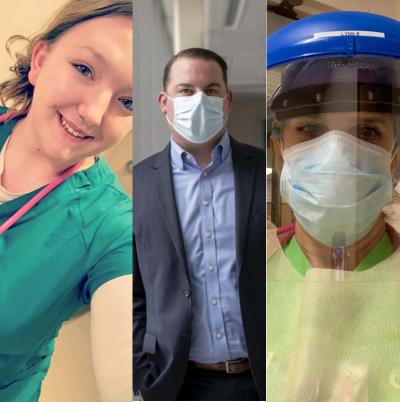Tri-Town Medical Workers describe experiences with coronavirus
The coronavirus pandemic has placed incredible strain on the healthcare system and been a universal problem for healthcare workers. Yet, each doctor, nurse and pharmacist has their own story. Here are three from Tri-Town residents.
***
In her role at the Intensive Care Unit at Tobey Hospital, Lynn Bliss has seen the sickest of the sick coronavirus patients.
She called the pandemic “scary, and very overwhelming,” even as someone who has worked in healthcare for 31 years and been at Tobey Hospital for 20 years.
Patients “get sick and get sick fast,” she said. At one point, her unit had eight coronavirus patients and seven of them were on respirators. Those who have died in the ICU at Tobey Hospital have ranged in age from 31 to their 90s.
While the Covid-19 caseload has waned at Tobey in recent days, down to just 20 cases and just 2 patients in the ICU by June 1, the hospital is still using new precautionary procedures. At the beginning of each shift, her temperature is taken.
Bliss’ unit also feels different, with no visitors for patients. Nurses will try to FaceTime family members, but patients sometimes can’t respond.
The only exception to the “no visit” rule has been end-of-life visits, in which case families are allowed 10 minutes with their loved one.
Bliss also worries about bringing the disease home, and has been showering outside at her Mattapoisett home after shifts since March.
She wears two masks, a shield and a gown while in the Intensive Care Unit, and was asked by a patient if she was headed off to war. “It must look that way,” she said.
After 12-hour shifts dealing with the intense illness, Bliss finds herself “physically and emotionally exhausted.”
She wonders about the future.
“At what point will we feel comfortable being around others without masks again?” Bliss asked.
***
Brooke Myers went into the medical field knowing that, as a certified nursing assistant, she can’t hang up her job when she leaves work for the day.
This is now clearer than ever for the Rochester native and Old Colony Regional Vocational Technical High School graduate, who has to undress and dress in the garage before entering her house in Wareham.
Her father has medical issues. Her mom has breast cancer and had a hospital procedure on April 10. Myers wasn’t able to visit her, or either of her two sisters (she is a triplet) who live nearby after the procedure.
But, like many in the medical field, she feels called to help others.
“If we’re not there, patients are going to die alone,” she said.
She works 40-plus hour weeks split between different locations and is in her first year of nursing school online.
At Beth Israel Deaconess hospital in Plymouth, Myers works per diem 12-hour shifts once or twice a week in the critical care center (or intensive care unit). As of June 1, Beth Israel Deaconess has seen 115 total coronavirus cases, with 37 of those in the intensive care unit. The procedural changes as a result have been daunting.
At High Point treatment center in Middleborough, her job in admissions has changed, too. She spoke with a patient who waited three days after an overdose to call the substance abuse treatment center out of fear of contracting the virus.
Myers says she leans on her co-workers for support when she cannot visit family or friends.
She said they still joke and smile with each other in the ICU. For help, she texts friends who are nurses about problems instead of scaring her friends and family.
As for family, she calls them regularly and even did a drive-by parade the day before before her mom’s surgery.
“If we can get through this, we can get through anything,” Myers said.
***
Dr. Chris Fortier, Marion resident and chief pharmacy officer at Massachusetts General Hospital, makes decisions every day that affect how nurses and doctors tackle the virus.
His job is to determine how the pharmacy supports the hospital, and plan for new projects, such as a medical center in a Boston convention center, which he believes will be relevant for a long time.
“This is a marathon, not ‘we’ve hit the peak and it’s over,’” said Fortier. “This isn’t over anytime soon.”
After living for ten years in South Carolina, the New Bedford native took his current position, managing a team of 400 people and a $400 million budget, in 2013.
Fortier said Massachusetts General Hospital is a “pretty safe place to be.” Every employee wears a surgical mask and cleaning has ramped up.
But, having the supplies to save patients has been another issue. Fortier noted that hospitals face a drug shortage as much as they face shortages in protective equipment. Mass General had the most coronavirus patients of any hospital in the state (it still has 151 people hospitalized and 45 patients in the ICU for coronavirus as of June 1).
And many of those patients were also heavily medicated to keep them sedated and fight off the disease.
“The number of drugs we are preparing in a day has gone up tremendously,” he said.
And an uncertain supply chain made Fortier anxious about how to get supplies.
Although he knows where the drugs come from, “I don’t know where raw materials come from. Even the FDA doesn’t know that,” Fortier said.
Because of this, Fortier went on local and national television to remind politicians, “if you don’t have drugs to keep patients on the ventilator, it doesn’t work.”
In addition to drugs aimed at directly fighting the disease, patients on mechanical ventilators need to be heavily sedated to prevent them from panicking and removing breathing tubes.
While Fortier said the hospital is “managing well,” he acknowledged it has been tough for him personally and emotionally.
His wife is also in healthcare, so extended family has stepped in to help with his children, as Fortier has been working sometimes seven days a week.
Then there has been the “stress, anxiety. Worry about my staff and the patients we treat.”
Still, he feels “this is why I went into healthcare from the get-go, to help patients.” And he is grateful to still have a job.












